Some lessons on contrarian investing from my bad election call
The general election result will have caught many investors by surprise. John Stepek looks at what lessons can be learnt.

Get the latest financial news, insights and expert analysis from our award-winning MoneyWeek team, to help you understand what really matters when it comes to your finances.
You are now subscribed
Your newsletter sign-up was successful
Want to add more newsletters?

Twice daily
MoneyWeek
Get the latest financial news, insights and expert analysis from our award-winning MoneyWeek team, to help you understand what really matters when it comes to your finances.

Four times a week
Look After My Bills
Sign up to our free money-saving newsletter, filled with the latest news and expert advice to help you find the best tips and deals for managing your bills. Start saving today!

OK, so now we know. For the moment, Theresa May is trying to form a government with the DUP. We'll see what happens next. But overall, things look worse now than they did before the general election.
I'm not interested in dissecting the exact politics of why May did so badly or why Jeremy Corbyn did so much better than expected.
I'm more interested in what the whole thing can teach us about how markets work, and how to improve our own thought processes. I'm being selfish here, because I didn't see this coming, and the truth is that I should have kept my eyes open and thought about it more objectively than I did.
MoneyWeek
Subscribe to MoneyWeek today and get your first six magazine issues absolutely FREE

Sign up to Money Morning
Don't miss the latest investment and personal finances news, market analysis, plus money-saving tips with our free twice-daily newsletter
Don't miss the latest investment and personal finances news, market analysis, plus money-saving tips with our free twice-daily newsletter
So where did I go wrong, what does it tell us about markets, and what do I plan to learn from it?
The higher the expectations, the more scope for disappointment
Firstly, sentiment was off the charts. When Theresa May announced that the election was coming, she was going to win the biggest landslide the Tories had seen in decades. She was the second coming of Margaret Thatcher.As for Corbyn, it was the death of Labour. The party was facing extinction, and everybody thought he was the second coming of Michael Foot, only worse.
It was very plausible. When sentiment gets that hyperbolic whether in markets or in fashion or in politics the arguments always do sound plausible. Yet history also shows that the more hyperbolic the expectations, the greater the opportunity for disappointment.
So when you see a situation that looks extreme, what you have to do is step back and look at things with a much more critical eye. Because reversion to the mean is a powerful force.
Ask yourself: does this seem right? What would it take for sentiment to shift just a little? What would it take for May to mess up, and for Corbyn to seem just a little more electable?
Expectations affect fundamentals and vice versa
There are several reasons why overly high expectations tend to lead to disappointment, but one particularly powerful one is what George Soros calls "reflexivity". Soros has written entire books about this idea, but put very simply, it's the idea that the fundamentals affect markets, but that markets affect fundamentals too.
So rising prices change the behaviour of a company for example, it might become more acquisitive. That in turn attracts more investors who see a rapidly expanding, aggressive company. They bid up the share price, it makes more acquisitions, gives its executives ever-bigger pay packages, and eventually the whole thing blows up when they over-reach themselves.
So prices (or expectations) shape behaviour (or fundamentals), which shapes prices, and so on. Often the market self-corrects prices rise or fall to reflect fundamentals and companies manage expectations to keep prices broadly in line. But sometimes the pair just feed off, and amplify each other in a "positive feedback" loop, encouraging ultimately self-destructive behaviour.
A similar thing happened with May and Corbyn. May went into this election thinking it would be an easy ride. On the one hand, that encouraged her to take some extremely stupid risks with the Conservative party manifesto. The social care policy was a commendable if misguided attempt at honesty, but bringing up fox hunting was just plain stupid.
And on the other hand, it gave her the mistaken confidence to avoid taking big personal risks(such as appearing on debates, say) that might have damaged her lead, and instead she stuck to a tightly managed messaging strategy. That backfired badly. She appeared distant and easily flustered.
With Corbyn, on the other hand, because expectations were so low, it wasn't hard for him with a bit of media training and a PR team that learned quickly to keep the nastier elements of the party off the TV to come across better than people had expected, even if he did make the odd gaffe.
Avoid confirmation bias and"it's different this time" thinking
The stray YouGov survey that originally suggested a hung parliament was not a "proper" poll it was experimental, and the company always said that. But I shouldn't have dismissed it so readily. It wasn't the only poll that suggested that things were tightening up.
And if I'd spent more time looking at economic indicators, it was also clear that the omens were not good. When UK house prices are struggling, voters tend to punish the party in power. When consumer confidence is fragile, the margin of victory gets smaller.
Finally, it was also clear that this was becoming a two-party race. That's not the way things were supposed to go. The original narrative was that Labour would lose working class votes to Ukip, and "Remain" votes to the Lib Dems.
As it turned out, Ukip got slaughtered, the Lib Dems pottered along in their usual Lib Dem manner, and instead, people flocked back to their old tribes. That was very clearly happening almost from the start, so I should have realised that something was wrong with the story, and thus revisited my assumptions.
In short, there were too many little bits of data pointing to a disappointment for the Tories that couldn't be dismissed without reaching for a "it's different this time" argument. And, on average, it usually isn't "different" this time.
Listen to your gut
This is an extension of the point above, but I think it's worth splitting out, because so much of investing is about knowing when to pay attention to your emotions and when to ignore them.
I went into this fully expecting the Tories to win, and believing that Theresa May had made the right decision. That was a high conviction view, which is one reason that I didn't pay as much attention as I should have.
Then all the way along, there were little niggles. May made strange decisions fox hunting was a shocker, the cap on energy prices was another which suggested that she was either being advised badly or was just plain flakey, and either way, that meant she wasn't the Tory dynamo she'd been set up to be. The U-turning made her look weak, at a time when her key selling point was her strength and her ability to hold her own under fire.
Meanwhile, Corbyn's gaffes and his history simply didn't stick to him, and he stopped being so hostile to the media. He even started to look like he was enjoying himself, and less telegenic cronies like John McDonnell disappeared from view.
And smart people (like Nate Silver) were pointing out that a hung parliament had a bigger chance of happening than markets were pricing in.
All of these things were nagging away at me. But I ignored them. That's partly because it would have been hard to figure out a killer trade to put on in any case (unless I felt like messing about with short-term sterling punts).
But it was also down to confirmation bias - I just didn't particularly want to revisit my assumptions because it would have meant unpicking a big part of my view of "what's going to happen next?", which is always uncomfortable. Moreover, I simply found it very hard to believe that people would vote for Corbyn, despite ample evidence that plenty of people didn't find ithard to do so at all.
So that's my mea culpa. And I think it's worth remembering all these points for any investment situation.
Look at the assumptions that are baked into a market. Are they realistic? What happens if those assumptions are wrong?Is there any margin of safety there room for manoeuvre if the market is wrong? And if not, what sorts of indicators might alert you to the fact that a situation is changing, or that the story is different to the one that the market is counting on?
As I say, in this case, it wouldn't have helped much. But I might have had less of a rude awakening come 10pm and the exit poll last night.
An update on the six charts that matter
Now let's take a quick look at our six charts that matter. The lack of movement clearly shows just how much the UK election actually matters to the majority of markets ie, very little.
First, gold. Good week, was at $1,270-odds. This week it's climbed a little higher, partly because while we've all been worrying about the generalelection, tension has grown in the Middle East between Qatar and Saudi Arabia inparticular. We'llhave more on that topic inMoney Morning next week (if I can squeeze it in past theelection coverage).
I'd hang on to gold. I always say that, but with things looking wobbly in various unexpected areas, I think reasonably priced insurance is very worthwhile right now.
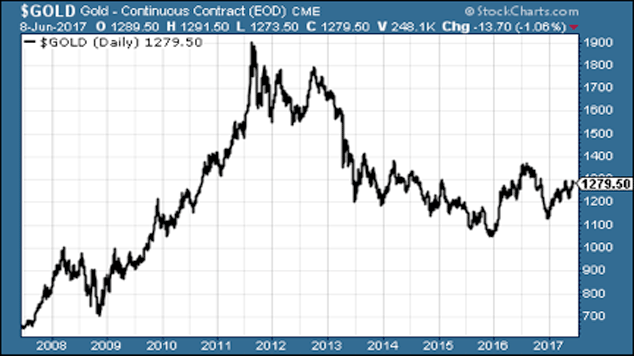
Second, the US dollar index. The dollar wasn't much changed on the week we'll see what happens when the Federal Reserve meets up next week. The US central bank will probably put up interest rates, but the interesting part will be the accompanying talk about the direction of future hikes.
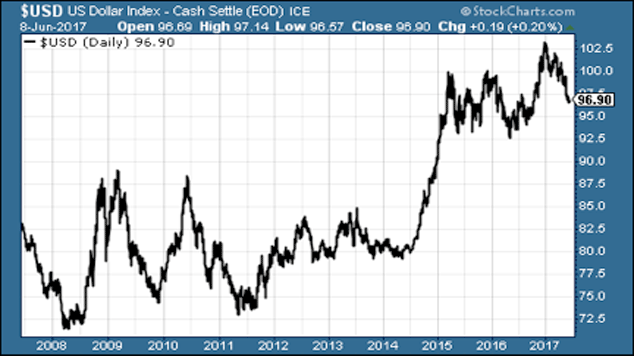
Third, ten-year US Treasury bonds not much has changed after sliding to a 2017 low the previous week.
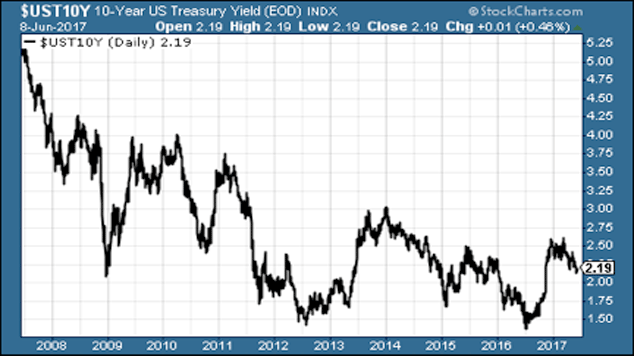
Fourth, copperis back up to $2.61 from around $2.55 last week.
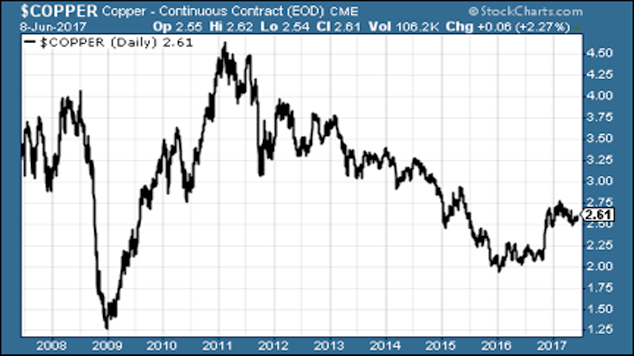
Fifth is bitcoin it has continued on its merry way higher.
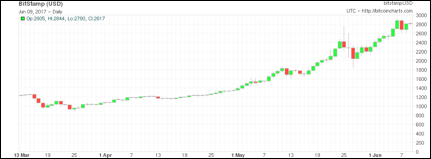
(Source:Bitcoincharts.com)
Finally, US jobless claims data. David Rosenberg of Gluskin Sheff reckons this is a valuable leading indicator.When the figure hits a "cyclical trough" (as measured by the four-week moving average), a stock market peak is not far behind, and a recession follows about a year later.
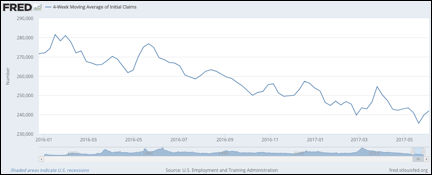
We hit a fresh low at the tail end of last month, and the four-week moving average is still near its lowest level since April 1973.
Have a great weekend, and try not to read too much election coverage there'll be more than enough of it next week
Get the latest financial news, insights and expert analysis from our award-winning MoneyWeek team, to help you understand what really matters when it comes to your finances.

-
 Should you buy an active ETF?
Should you buy an active ETF?ETFs are often mischaracterised as passive products, but they can be a convenient way to add active management to your portfolio
-
 Power up your pension before 5 April – easy ways to save before the tax year end
Power up your pension before 5 April – easy ways to save before the tax year endWith the end of the tax year looming, pension savers currently have a window to review and maximise what’s going into their retirement funds – we look at how